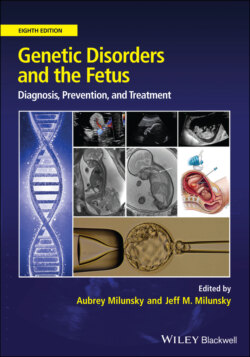Читать книгу Genetic Disorders and the Fetus - Группа авторов - Страница 56
Disorders with suspected anticipation
ОглавлениеAblepharon–macrostomia syndrome
Adult‐onset idiopathic dystonia
Autosomal dominant acute myelogenous leukemia
Autosomal dominant familial spastic paraplegia
Autosomal dominant polycystic kidney disease (PKD1)
Autosomal dominant rolandic epilepsy
Behçet syndrome
Bipolar affective disorder
Crohn disease
Facioscapulohumeral muscular dystrophy
Familial adenomatous polyposis
Familial breast cancer
Familial chronic myeloproliferative disorders
Familial Hodgkin lymphoma
Familial intracranial aneurysms
Familial pancreatic cancer
Familial paraganglioma
Familial Parkinson disease
Familial primary pulmonary hypertension
Familial rheumatoid arthritis
Graves disease
Hodgkin and non‐Hodgkin lymphoma
Holt–Oram syndrome
Idiopathic pulmonary fibrosis
Lattice corneal dystrophy type I (LCD1)
Li–Fraumeni syndrome
Ménière disease
Obsessive–compulsive spectrum disorders
Oculodentodigital syndrome
Paroxysmal kinesigenic dyskinesia (PKD)
Restless legs syndrome
Schizophrenia
Total anomalous pulmonary venous return
Unipolar affective disorder
Recognition in the last decade of hexanucleotide repeat expansions in the C9orf72 gene reveal additional challenges that have raised consideration of prenatal diagnosis, as discussed under “Accurate diagnosis.” Mutations in C9orf72 have been reported in 40–50 percent of cases with familial amyotrophic lateral sclerosis, between 3.5 percent and 8 percent of sporadic ALS cases,792–795 and in 25 percent of familial frontotemporal lobar degeneration, with about 7 percent in sporadic cases.793, 794 The clinical spectrum includes patients with frontotemporal dementia and ALS as well as those with a corticobasal syndrome.796 The real burden and likely involvement of prenatal diagnosis is the recognition of C9orf72 expansions noted in Western Europe as occurring in 18.52 percent of familial cases and 6.26 percent in sporadic cases of frontotemporal lobar degeneration.797 Overall frequencies of these expansions in Finland, Sweden, and Spain were much higher, being 29.33 percent, 20.73 percent, and 25.49 percent, respectively.797 A further distressing aspect of the C9orf72 expansion is the symptomatology that extends to family members who do not have the expansion. In a study of 1,414 first‐ and second‐degree relatives, a statistically significant number had an increased risk of schizophrenia (hazard ratio of 4.9), late‐onset psychosis, and suicide.798 There is also evidence of anticipation.799
Preimplantation genetic testing (see Chapter 2) has been successful for many repeat expansion disorders including fragile X syndrome (see Chapter 16), Huntington disease, myotonic muscular dystrophy, and spinocerebellar ataxias types 2 and 12.800–802
